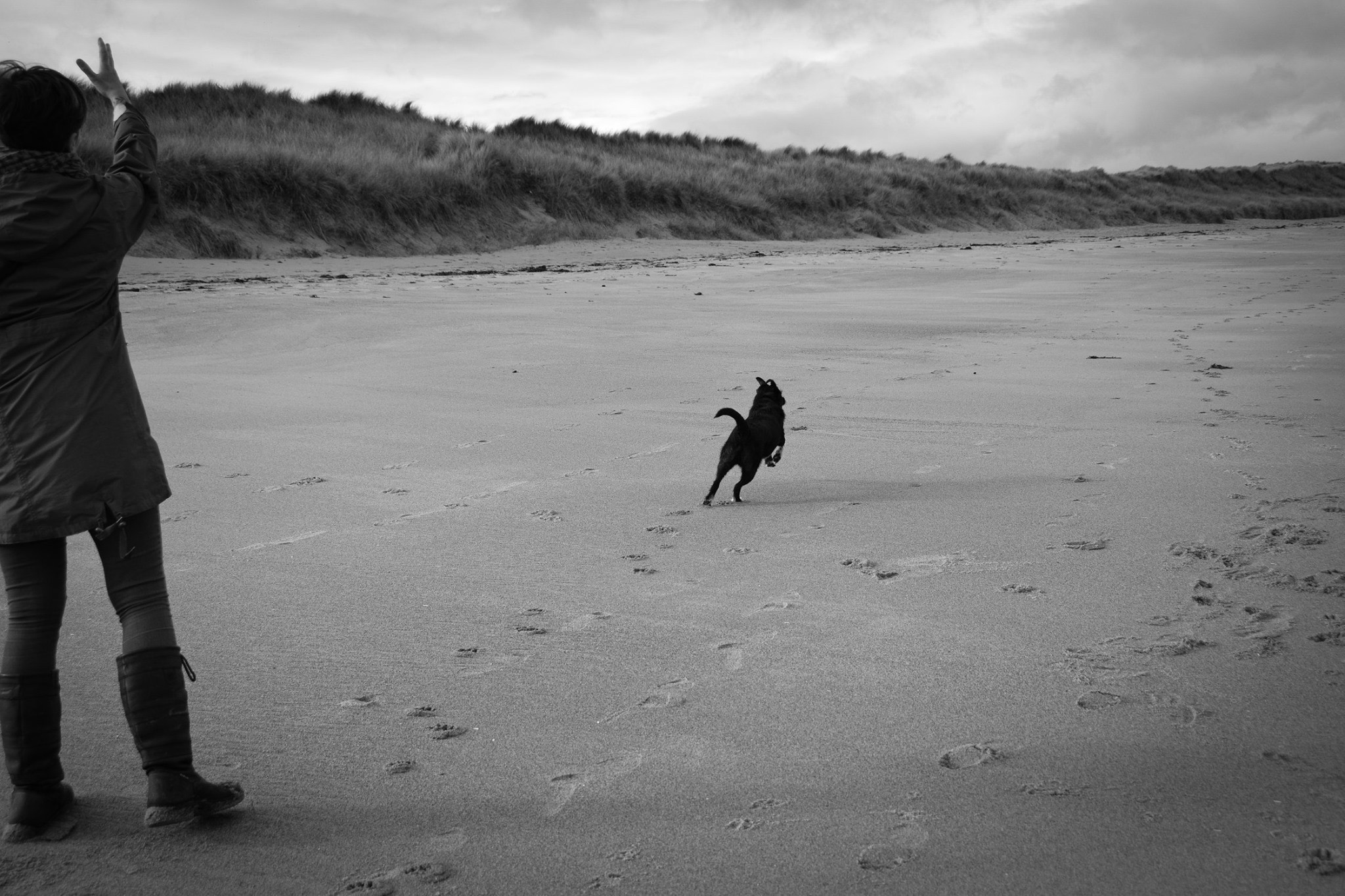Overseas Rescue Dogs: what to expect & how to help them
In 2012 UK animal quarantine regulations were brought into line with those of other European countries and since then the number of rescue dogs arriving in the UK from countries such as Romania, Greece & Cyprus has rocketed. In 2013 no dogs were imported to the UK from Romania; by 2018 there were over 15,500. Almost every one of us now knows someone with an overseas rescue dog. I have one myself….my boy, Charlie, started life in Romania.
In fact, Charlie is the reason I now do what I do. Adopting from overseas was never the original plan but, like many overseas adopters we found ourselves excluded by UK based rescues due to their re-homing policies.. So we cast our net wider and found Charlie. Overseas adoption was less common then and I took it all at face value and didn’t really consider the possible ramifications of our decision. We wanted a dog friendly, people friendly dog who would fit easily into our family life (…we didn’t want much, did we? Especially from an abused ex-street dog….). What we got was a dog who couldn’t cope with strange dogs in his space and would lunge, snap, growl and try to bite them if they got too close. Miraculously, given that he’d suffered abuse at the hands of humans he had no issues with people. I quickly realised I was out of my depth with Charlie and sought professional help. What I thought would be one session to ‘fix my dog’ (…how little did I know?) turned into months of private training sessions and a huge commitment of time, effort and money. That ‘one session’ was the first step on a journey of learning that has lead me to where I am today.
I was fortunate. I had the time, energy, motivation and money to invest in helping Charlie and I found the right trainer to help us. Because of that things worked out well for us. I’ll never regret adopting Charlie because (a) he’s wonderful and (b) it lead me to a career I love but it wasn’t really what I signed up for. And I now regularly see both people and dogs who are struggling and stressed. The people find themselves with dogs with behavioural issues which they are ill equipped to deal with. And the dogs find themselves living in a world that they find stressful and overwhelming. As the demand for overseas rescues has grown so too has the number of rescue organisations. Skills, experience and ethics vary widely and, sadly, some adopters find themselves with a dog who is beyond their skill set with very limited assistance from the rescue organisation who placed the dog with them.
People’s motivations are good and they take overseas rescue dogs into their homes for many reasons –
- to save them from life (and death) in often brutal public shelters in countries with very different attitudes to dogs than ours;
- to ‘save’ them from a life on the streets;
- because UK re-homing charities often have very rigid & restrictive re-homing policies which can make it difficult, if not impossible, for some families, including mine, to adopt from them;
- because it’s easy (and often easier than it should be). Many overseas rescues have a very active social media presence and it’s very easy to scroll through hundreds of pictures of dogs looking for homes, pick a dog and apply to adopt all without leaving the comfort of your sofa.
The ease with which it’s possible to choose & adopt an overseas rescue dog can sometimes belie the reality. While some dogs will settle beautifully into a new home, some will need help…some a lot of help, so it’s important to be both realistic about, and prepared for, what you’re about to take on.
If you are contemplating adopting a dog from overseas some things to consider….
- Your new dog may never have lived in a home before; may never have lived with humans before. So much will be new & strange to them – sights, sounds, smells, being indoors, having their movements restricted (or being able to move around, if they’ve previously been chained). To them your safe, comfortable home may be a frightening and stressful place;
- They may not have had good experiences with humans. Attitudes to dogs in some countries, particularly Romania, are very different to those in the UK and your dog may have been mistreated, hurt and abused. Your dog carries that trauma with them and it almost certainly will have an ongoing effect on their behaviour, perhaps for the rest of their lives;
- They are likely to be in a state of stress, chronic or acute, when they come to you. At the very least they will just have completed a very long, stressful journey across Europe. At worst they having been living in stressful conditions on the streets or in shelters for prolonged periods. The levels of stress hormones like adrenaline & cortisol coursing through their bodies will be high and they will need time to recover from that;
- You are adopting an unknown quantity. The extent of temperament testing varies hugely from rescue to rescue. Some do their best but it’s very difficult for rescue organisations to properly assess a dog’s temperament in a shelter environment. A dog may appear calm and placid when in reality it is completely shut down….so stressed and frightened that it’s unable to display any behaviour. Take account of the assessment made by the rescue but don’t rely on it. Consider the possibility that your new family member may come with behavioural issues as a result of previous trauma or genetic factors. These may take time and money to address. Are you prepared for that? Are you willing to make that commitment?
- Your new dog doesn’t know they have been ‘saved’. In some cases they may have been content with their free roaming lives on the streets. They may find their new life stressful. We have to be prepared for the possibility and put to one side how we think our dogs ‘should’ feel.
If you have decided to adopt from overseas some ways to make the transition as gentle as possible for your new dog…
- Give them time. Time to decompress from the stress of travel. Time to sleep. Time to get to know you at their own pace. Time to get to know their new environment. Don’t rush them. Let them explore their new home at their own pace. Don’t coax & cajole them to do things. Don’t be in a rush to take them out for walks or meet lots of people or interact with other dogs…that will come. For now just let them ‘be’.
- Give them space. A physical space of their own – a crate or a bed or even a whole room where they have everything they need – a comfortable bed, water, food, a few toys (although don’t be surprised if they don’t play much at first), a chew – and where they will be left alone. And personal space. Let them choose to approach, or not. Let them initiate contact & interaction. Give them the space to learn to trust you.
- Manage your expectations. Your dog might adapt to their new way of life seamlessly. Let’s hope they do! But they might not. They may struggle with aspects of it. They may seem reticent to approach you. They may keep their distance. They may react fearfully to seemingly innocuous things. They may not want to do ‘dog things’ like go on walks or play. Don’t expect too much and be prepared for things to take time. Don’t become frustrated if they don’t embrace their new life right from the start. Try to see things from their perspective, not yours.
Someone asked me recently if I would recommend adopting from overseas. In all honesty I’ve found that an impossible question to answer. So much depends on the experience and capabilities of the prospective adopter and the skill and experience of the rescue in assessing both dogs and potential adopters. Our own experience of overseas adoption has turned out well and I can’t imagine life without Charlie. But it turned out well because of the time, effort and commitment we put in. If we had been unable to do that, he’d be living a far more stressful life which would inevitably have had a detrimental effect on his wellbeing and his behaviour. I’ve seen overseas adoptions that have worked wonderfully but I have also seen many examples of fearful, damaged dogs in homes where their well-meaning new owners are out of their depth and don’t have the resources to give their dogs the help they need.
If you are considering adopting from overseas then you owe it to yourself, and to your prospective new dog, to consider all the potential negatives as well as the hoped for positives. Don’t let your heart rule your head. Be honest with yourself. How would you feel if your new dog carries some baggage from their previous life? If they struggle to slot into your life could you cope with that? Do you have the time, the finances and the patience to devote to helping your dog if they need it? Do your research into the many rescue organisations rehoming dogs from overseas. Some take their responsibilities seriously, others less so. Are your expectations realistic or rose tinted? Be clear eyed and honest.
I’d never be without my boy. I’m glad every day we found each other and seeing him living a safe, happy life fills my heart with joy. It can work. But it’s not a fairy story.

